hiya! just my brainrot and safe spaceblog that I actually post onyou can read my pinned for my info!!
Don't wanna be here? Send us removal request.
Text








local woman receives life changing advice from gay cartoon hedgehogs
5K notes
·
View notes
Text
"Your choices do(n't) matter" -> Deltarune to Undertale
I have been wanting to make a post for a long time, but I have a free hour on my hand and a mind full of Deltarune soo allow me to draw my favorite parallels about how Undertale and Deltarune both tackle the concept of choice, and how they are distinct but both still tell a necessary story.
Also, if you are reading this post, I am assuming you have played through Undertale and Deltarune Chapters 1 and 2, because this post will have spoilers for both. Without further ado…
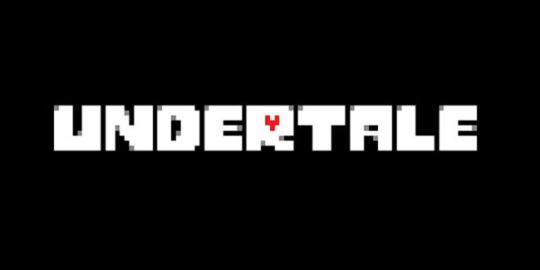
Undertale’s approach when it comes to choice is one that directly targets and addresses the player. Much of the characters’ dialogue with Frisk often address them as “the human”, which, depending on your stance, could be a comment meant to speak to Frisk as a character, or to you, the player, as a human being.
In fact, as much as I adore Frisk as a character all of their own, they aren’t necessarily given any defining personality traits. They are, in the purest of senses, meant to directly be an in-game representation for the whims and desires of the player. “They” act, “they” fight, “they” flee, but it’s always you, the player, making the decisions. This isn’t necessarily a unique concept, but it’s the way that this is applied that makes this particular idea special in Undertale.
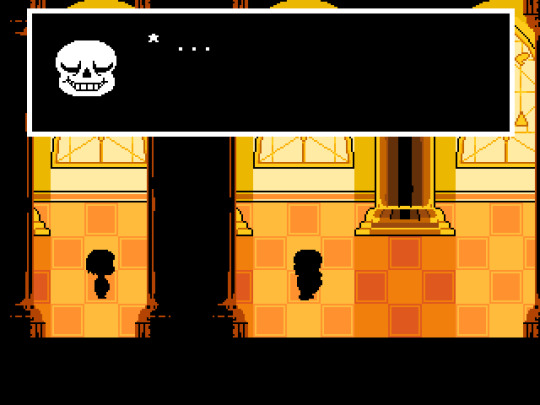
Obviously, the most noticeable instance of this is when Sans calls the player out towards the end of the game, explaining that those little levels and numbers that we, as the player, loved seeing go up, were affecting the world that we had just spent the last few hours immersing ourselves in. There is a direct effect of our choices on this universe. It is a pre-established place, and it will continue without us, the player, making an impact. In fact, in the neutral and genocide routes, you are actively making this universe a worse place! It puts the player in the position to act as themselves and make a decision about how they want to impact this virtual world. In essence, the decisions made by Frisk and you, the player, are presented as one in the same. Frisk isn’t necessarily seen as a vessel for your intentions, but rather, as your intentions themselves.
This created a unique meta-narrative when it came to the idea of how we, as players, consume media in universes. It presented the idea that universes made by creators aren’t just things to pick up and put down, but that each game world has their own story that continues onwards, with or without input. You aren’t seen as some great hero, but rather a nuisance at best, a mass murderer at worst. This was the way that Undertale addressed the idea of stories in their universe: you, the player, were seen as synonymous with Frisk, the character.
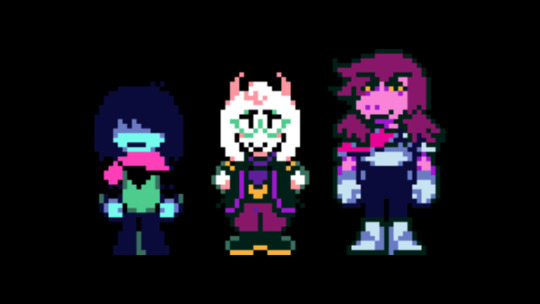
Deltarune took a different approach to this. Of course, it becomes instantly recognizable to players that “our choices don’t matter”, which is told to us almost immediately in the game. There are some sections of the game where the decisions you make don't directly influence the storyline, which differs from the narrative set by Undertale. It takes this idea of “choice” that we had pre-established going into the Deltarune experience by Toby Fox’s other works and toys with it.
Kris is their own individual. Kris has had a hard time making friends. Kris has a brother at college, and is a known town citizen. Kris is greeted by neighbors, classmates, and teachers. Kris loves chocolate and pies, shows anger at Spamton’s demise, and has a tendency to make some scary jokes (as referenced by Noelle). They are their own person. This is when Undertale and Deltarune start to split on the concept of choice.
Frisk was seen as the culmination of the player themselves, but Kris isn’t the player. This is what makes the ending of Chapter 1 particularly shocking– the idea that Kris could directly address us, the players, and our influence on them, by removing their soul. They don’t want to be the culmination of our actions. They want to be Kris.
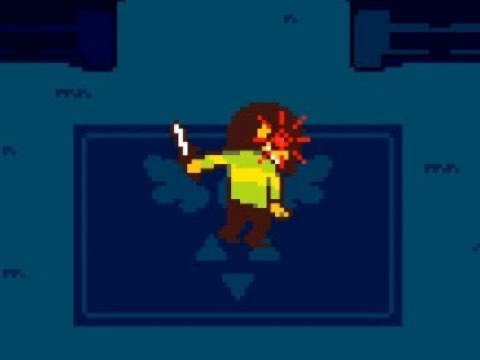
This is where the idea of choices is twisted from our prior conceptions. Just like in Undertale, our choices in Deltarune are either praised or criticized depending on how we interact with the world we are given. However, in Undertale, we are judged as players by the characters aware of our influence. In Deltarune, we are judged in a far more intimate setting: directly by the person we are instructing to do our bidding. Because, at the end of the day, our choices do matter in Deltarune. They just matter on a smaller scale. They matter to Kris.
In this way, both games address the way our choices are impactful; they just happen to do so in two, unique settings. I think this is what makes both Undertale and Deltarune so interesting– they have a similar concept, but they completely flip the script on what that concept means, and how it applies to universes.
121 notes
·
View notes
Text
Undertale’s Meta Narrative: Understanding the player's three main narrative “stand-ins.”
For those who came in late or are currently playing deltarune, I'd like to take a moment to revisit Undertale, its parallel story, for the sake of context in themes. In this post I will analyze the meta-narrarive of Undertale as represented through its main characters.
Frisk, Chara and Flowey/Asriel each represent a core aspects of the player while being distinctly separate from the player. Because, unlike the player, they can't be removed from their world. Their context.
In Deltarune, (I haven't yet touched Ch. 4&5 because of exam season,) the questions of control, identity, freedom, escapist sentimentality etc. are central–and the game provides an even more mature exploration of them, through a protagonist that is both completely aware of the player's control and outwardly rejects them. There's a lot more to discuss when it comes to analyzing Kris, but this is an Undertale post first and foremost, to provide some context to the same themes.

1. Frisk:
Playable, but not representative of the player nor a self-insert. Their character is purposefully vague and quiet, so that you ASSUME they are a self-insert, (just as you assume it is them you are naming at the beginning of the game,) while actually having a full personality & agency of their own.
They choose how to deliver the lines you make them say & go out of their way to introduce themself to Asriel by name without you doing anything to prompt that. Also, all by themself, they ask Gerson what would happen if Asgore adopted them–if he'd continue aging. This implies a semblance of free will outside of the player–as well as them having their own desires.
I like to think that frisk is aware of Chara, but isn't aware of the fourth wall or the player as a separate entity. They go on to live their life, having no control over the player's choice to reset. Hence why Flowey tells you to let Frisk live their life. The determination stems from their soul, awakening Chara and having the power of resetting appear. But once they're out of the underground, it is not up to them.
However, when they are in the underground–they provide the player with choices. To me, the dialogue options, the Fight vs Mercy mechanic and everything else, are things that Frisk is considering already. Pondering on, thinking about. They won't actually do anything that goes completely against who they are, hence why they refuse to laugh at the amalgamates, or why they refuse to even consider taking the soda from undyne's house or alphys' fridge. They hate soda! They also don't let you take any more pieces of pie, because they're intimidated by it, even though it'd be very useful. Their personality also shines through by what they are given determination by. The simplest, most mundane things–from pointless garbage, to small mice in holes. They find beauty in everything.
So, we have the characterization down–but what does Frisk represt as a figure? As our playable character?
Frisk is at that vulnerable age when you are first developing your worldview based on your influences.
In the pacifist route, Frisk represents innocence. They follow the strongest influence they've had–assuming they are a parentless child, that being Toriel–and learn to practice the way of mercy.
They represent the player's pure-hearted sentimentality. The player's ability to just love the game and its characters, as they explore the underground. The player's desire to understand what's going on for the first time, make their choices, develop their playstyle all while falling in love with the friends they make along the way and deciding that, maybe I would rather stay.
Their pondering to kill comes from fear, perhaps, at first, in neutral routes. But in genocide? There is no, "despite everything, it's still you" but instead, "it's me, Chara/ {your name}," which means Frisk has entirely lost themself in the process of wiping everyone out and someone else's influence has taken over.
‼️The player sacrifices their connection to the world and characters to the altar of curiosity, (flowey) completion (chara) and the warped sentimentality of not wanting the game to end yet (asriel.) And so, the player has sacrificed Frisk, who represents exactly what made the pacifist route so moving. Connection.
Frisk is part of this world, the player isn't. Immersion broken, the narrative sacrificed, for a deeply unsatisfying process and a conclusion in which you literally sell your soul.

2. Flowey / Asriel:
Flowey is a character who, in order to fully understand, you do in fact have to play the game in each entirety. You have to become him in order to know him. He is everywhere, everything. The villain, the hero, the protagonist, the antagonist, the victim, the perpetrator, the tale of tragedy, the tale of hope, the tutorial for genocide, the key to true pacifist. The most important character in the whole entire game.
He represents the player's curiosity–and it's clear as day.
You know there won't be any real consequences. These characters aren't real, you can take it all back. And as you commit genocide after befriending everyone probably a hundred times over, you tell yourself, "I don't like this, I'm just doing this because I *have* to know what happens–" but do you?
Just because you can, does that mean you should?
Flowey becomes desensitized to violence and even dependent on it–in this world, it's kill or be killed. To challenge that mindset, is to pretend you haven't practiced it, haven't engaged in it–which is why he mocks you when you kill toriel, even accidentally–and then come back to spare her. He considers it inevitable that eventually, you'll play the game by his rules. And eventually, you do. Not because you have to, but because you can. In the friendly rpg where no-one has to die, you're still curious to see what happens *if.*
Flowey is unfeeling and disconnected. Soulless– even though another version of him really loves the people he's hurting now to see what happens. To see how they'll react. If he'll feel anything. If things will suddenly start making more sense and if his actions will start gaining purpose again. If he'll gain more information, maybe, instead of repetitive, predictable dialogue. And isn't that the whole situation of the player? The player, you–another version of whom loves these characters, hurting them to see how they'll react and if you'll gain new data. Curiosity killed the flower–and it chastises the player, too. Leaving them soulless and hollow.
Asriel, meanwhile, has all the love. Actively.
He has too much of it. He can feel everyone's heartbeat at the same time, aching for the same catharsis. He feels endlessly and he doesn't want that to end. He'll keep you there over and over because he doesn't want to let go of these feelings. He loves you, loves this world, this connection to the friends you've made–and doesn't want to return to nothingness.
He's willing to kill you again and again if it means you'll keep playing with him. He's willing to help you get different endings–willing to deprive everyone of their freedom, keeping them in the underground by force just so that the game keep going. And isn't that warped sentimentality entirely representative of the player?
You as the player keep depriving them of their freedom BECAUSE you love them so much and don't want your time with them to be up. The reason you keep re-creating that world, the reason you keep destroying it. Why you keep fluctuating between villain and hero, never letting go. And as you keep doing it, squeezing all the content out of the game, out of Asriel, he always asks–
“Don’t you have anything better to do?”
And no, the game doesn't punish you for loving it. It merely challenges the way you practice that love–because it knows, inevitably, you'll love it most when you're ready to let it go. And it knows, inevitably, that will take a while.

Onto the hottest topic, now.
3. Chara / “Y/N”:
Ohh, boy. We're really in it now. Let's delve into arguably the most misunderstood and controversial aspect of utdr.
The player's scapegoat, (pun intended) for their own terrible actions.
Chara is the closest thing to a self insert. You can name them whatever you want at the start of the game–still, they are their own character that predates the player's influence. They aren't your vessel. You don't design them. You don't shape their personality. Their backstory has occurred way out of your control.
And isn't that interesting? Your supposed self-insert, having control in places where you don't? Even when you're misguided to think the first human died via a mysterious illness, it's later revealed that they were, in fact, the one in control of it. It was planned.
Flowey doesn't seem to know the difference between Chara and the player. When Flowey breaks the fourth wall, something that Frisk never does–he talks to the player and calls them by Chara’s name, whatever that may be. It's what he recognizes to be his sibling’s name regardless of if it's your own.
But Flowey isn't a reliable source of understanding when it comes to Chara, considering a moment ago he also thought Chara was Frisk. He conflates these things, because he has no player behind him–yet held the same resetting power. He assumes there's no third party. He assumes you and Chara are one and the same.
Chara themself, however, MAKES A CLEAR DISTINCTION BETWEEN THEM AND THE PLAYER. "you and I are not the same," and "I do not understand those feelings," when it comes to the warped sentimentality that plagues you to keep replaying the game over and over. They don't get it.
So, Chara is the closest thing TO the player, but they aren't the player. They are the only person, however, aware of the player's presence. Of their influence over the game. And yet they also know something much more important: The player isn't part of this scripted world, so even as they orchestrate its reactions and events–they are never truly the one in control. The game is in control of itself, at the end of the day, so it seizes said control via Chara.
In the pacifist route, narrator Chara, (a headcanon so widely supported it might as well be canon) is light-hearted enough. A faded presence in the background, trying to match Frisk's energy while making the world more easier to navigate for them. They know the steps, the scripts, the names of each random encounter. They provide Frisk with helpful information through “Check” that would otherwise be unattainable to them, even if often times it's just silly commentary or snippets of judgement over tomfoolery.
In the genocide route, the execution points and the levels of violence increase right into Chara's file. The soul they share with Frisk is given their name–Frisk's determination having awakened their sprit. And as Sans explains, the more you hurt, the more you kill, the easier it becomes to keep doing it. Chara's soul–already open to violence, because of the “unhappy” influences of their youth–becomes corrupted. Pushed to the highest level of violence.
Genocide Chara represents the player's desire of completion. Of seeing things all the way through. Of getting stronger and stronger. Getting on top of their game, finishing all there is. Being untouchable.
Chara, the very person who wants to “erase this pointless world” considers the player to be sick, twisted and perverted for doing it again and again. And when, post-genocide, you attempt soulless pacifist, Chara doesn't let you forget what you did. They chastise you, they remind you of your lack of control to protect anyone after the game is over. They don't let you get away with feeling good about yourself–because if you cared about these characters the way you claim you do, you would have never done what you did in the first place.
Chara does not understand the player's warped sentimentality. They only understood completion. And why? Well, as suggested by the poem about the number 9 Toby Fox released, Chara wants to become untouchable because they've been afraid. Hurt, betrayed. Humanity wronged them. Violence was instilled in them by force. Nothing can hurt you when you reach a certain point of completion. A certain point of control.
They climbed the mountain in a suicide attempt–and suddenly, became the hope of all monsters. Think of the pressure, the weight of that on a child–especially a child that has probably internalized by now that love is conditional and violence is possibly the only way. They are loved by monsters as long as they provide hope that one day the underground will be empty. The (literally) fallen angel of the prophecy–the demon that comes when people call its name.
Chara attempted suicide a second time, in sacrifice. The attempt was successful, the sacrifice wasn't. They attempted to get control of the situation to fast-forward the release of monsters. They didn't trust joy, or love, but they valued those who offered it. Monsters.
But Chara never valued their own life, or humans in general. They loved the Dreemurrs, even if they thought indeed that their hopes of equality and acceptance by humans were baseless. They let them hope, because they were loved for it.
But their affections were real. From the sweater they knitted for Asgore, to the childish little details like filling the glass to the brim because “it's the most efficient way,” to the friendship locket they shared with Asriel. To their willingness to die, trusting him to do as instructed.
They, “weren't the greatest person” and Asriel, now, as Flowey, has to redefine that whole entire codependent relationship and its many flaws–Chara's many flaws–but that doesn't make Chara evil. They climbed the mountain, “not for the happiest reason,” but desperately tried to give meaning to their survival. To give back to those who showed them what Mercy means, not matter the cost.
They are part of this world, unlike the player. They do not share the same disconnect. They're cynical–but not uncaring. They laugh to cope with pain, they joke morbidly. Never do they show vulnerability. They're in control when they die, when they kill, when whatever–they have to be. It is but a shield. Weakness is taken advantage of. Weakness, holding back, not seeing things through–that's, in Chara’s mind, what got Asriel killed.
They aren't wasteful like the player nor overly sentimental like Asriel. They are a secret third thing–efficient. Will killing 6 innocent humans free monsterkind? Do it. Will erasing this world at the end of genocide put an end to everyone's suffering? Do it. Will taking control of the soul to mock the player also take away their false sense of control, their false sense they can do whatever they want? That their choices are inconsequential and will be forgotten in the grand scheme of things? Do it.
But if it's never necessary, they'll never do it.
Pacifist Chara responds to the violence of humanity with a plan to empty the underground & free everyone. Asriel goes along with it at first but doesn't follow through. Asriel dies.
Genocide Chara responds to the violence of the player with a plan to empty the underground by “destroying this pointless world,” Flowey goes along with it at first but doesn't follow through. Flowey dies.
They're nothing if not consistent.
At the end of the day, the game is wrapped in a shroud of their tragedy. The tragedy of two siblings, two best friends, two stand-ins for the player, endlessly haunting the narrative–holding each other to impossible standards and coming to realize neither of them are what the other thought. That doesn't mean they don't love each other.
And the player, to whom their tragedy is a spectacle–the player who orchestrates it–isn't even fully in control. Because the main character that represents them does not respect them in the slightest.

Frisk, Chara and Asriel aren't the only instances of meta narrative in the game, nor the only parallels to the player. From Alphys to Sans, the conversation is endless. And the themes of identity and freedom are at the core of every single character in this game.
It is those three children, however, that are most often misrepresented, misunderstood, mischaracterized–and forced into binaries. We try to frame Frisk as the pacifist ending, Chara as the genocide ending–we treat Asriel and Flowey as one and the same, even though the notion of simplifying it that much makes Flowey himself uncomfortable– (he tried to be Asriel but the trauma shaped him into something else. The expectation of having to act as Asriel despite not feeling like it broke him.)
It's no less stiff than arguments of their genders! neither frisk nor chara are JUST stand-ins for the player, they're characters beyond it and their non-binary identities matter. Chara bad, Frisk good is just another pointless gender binary we try to impose on them lmao.
At the end of the day Undertale is a tale, full of allegory, that can only be told through a video game lense, or else it'd lose a whole lot of nuance.
170 notes
·
View notes
Text

Everybody says that komaeda is the moon and hajime is the sun, but I think it's the other way around
1K notes
·
View notes
Text
I suppose Danganronpa is for me what you would call a "problematic fave"? I fully acknowledge all the ways in which it sucks, but I enjoy its mysteries and characters regardless, and find its various faults somewhat endearing
Of the Devil on the other hand, is what I would call "the best game of all time, which makes me cum every twelve seconds, and actively need more of"
Ace Attorney is somewhere in the middle, where I think objectively it's better than Danganronpa though not as strong as Of the Devil, and ironically I'm not really as obsessed with it as either of them. It's just good without being truly remarkable for me.
#for me it’s like I hyper fixate on danganronpa despite the fact it’s problematic#it is very endearing#I have the neurodivergence where i’ll recommend it and then make an entire list of trigger warnings
206 notes
·
View notes
Note
Hey i just finished your infested sonic comic in record time and as both a gore and sonic fan I'd like to say DAMN YOU'RE INTO SOME CRAZY SHIT FR (affectionately) I'd also like to ask will there be any sonadow references in the future? I'm asking bc It's a popular ship ik and I'm just hoping you're not shifting your focus onto relationships and all that. tbh i don't mind the ship as long as it's not portrayed in a romantic/sexual way (I'm traumatized enough already)
oh man, don't you worry cuz there's no ships. I mean, I certainly wouldn't wanna traumatize you further with more gay people being in love with each oth -- wait what's that?
oh no
RUN!!! RUN!!!!! RUN!!!! IT'S, OH GOD --

599 notes
·
View notes
Text


IM SO CRAZY KODAKA JUST DROPPED LIKE A WALL OF TEXT FOR NAGITO WITH HIS WORLDVIEW, MORAL GRAYNESS, AND DEDICATION TO HOPE FOR HIS BIRTHDAY AGGHHHHHH ITS SO GOOD IM SO HAPPY HEHE CRUMBS OF NAGITO KOMAEDA CONTENT💗💗💗💗💗
83 notes
·
View notes
Text

komahina commission
192 notes
·
View notes
Text
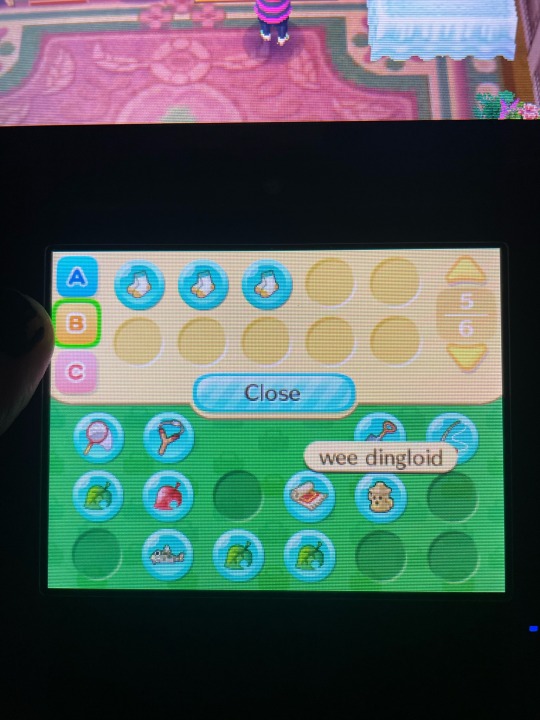
is that a wee dingloid in your pocket or are you just happy to see me?
182 notes
·
View notes
Text
hello! today I want to talk about the new Danganronpa stuff that was announced today. It’s the 15th anniversary of Danganronpa! as a result they’re making a Hajime Hinata nendoroid and a monokuma nendoroid is announced.


There is new art for a lot of the characters for a Round 1 collaboration with Danganronpa???

I especially like Hajime Hinata here, he’s very beautiful. There’s definitely more stuff than this I think? There’s a website talking about more, but I can’t exactly read it. Either that or more just hasn’t been announced yet. I’m excited for more content, even if it’s just anniversary crumbs.
Thanks for reading!
#danganronpa#nagito komaeda#hajime hinata#shuichi saihara#kokichi oma#kokichi ouma#junko enoshima#kaede akamatsu#kiibo#chiaki nanami#makoto naegi#sayaka maizono#kyoko kirigiri#ibuki mioda#danganronpa 2#danganronpa v3#danganronpa 15th anniversary
43 notes
·
View notes
Text
When writing an analysis or about a character in a fanfic it really helps to listen to their theme song if the media has music
4 notes
·
View notes






